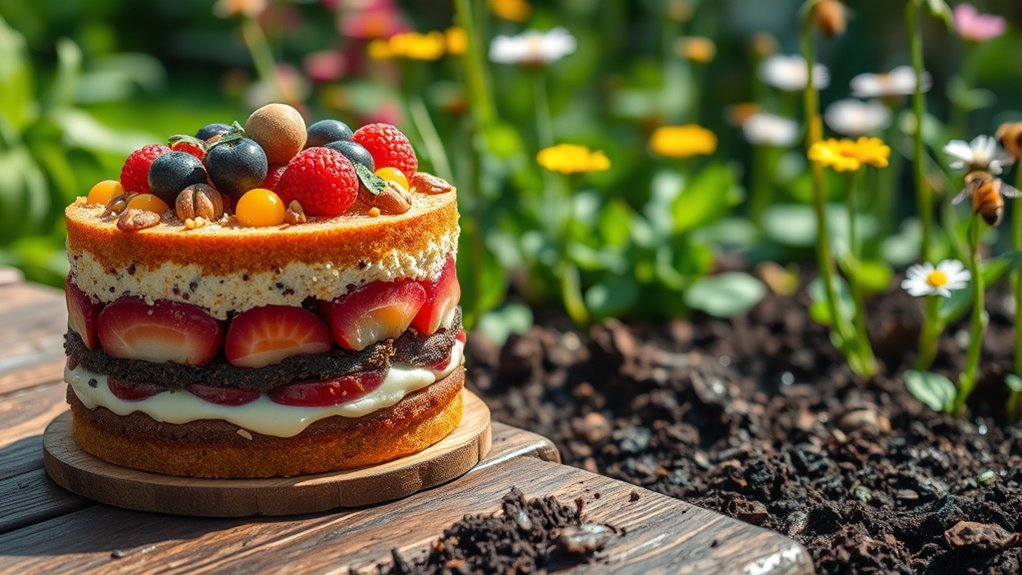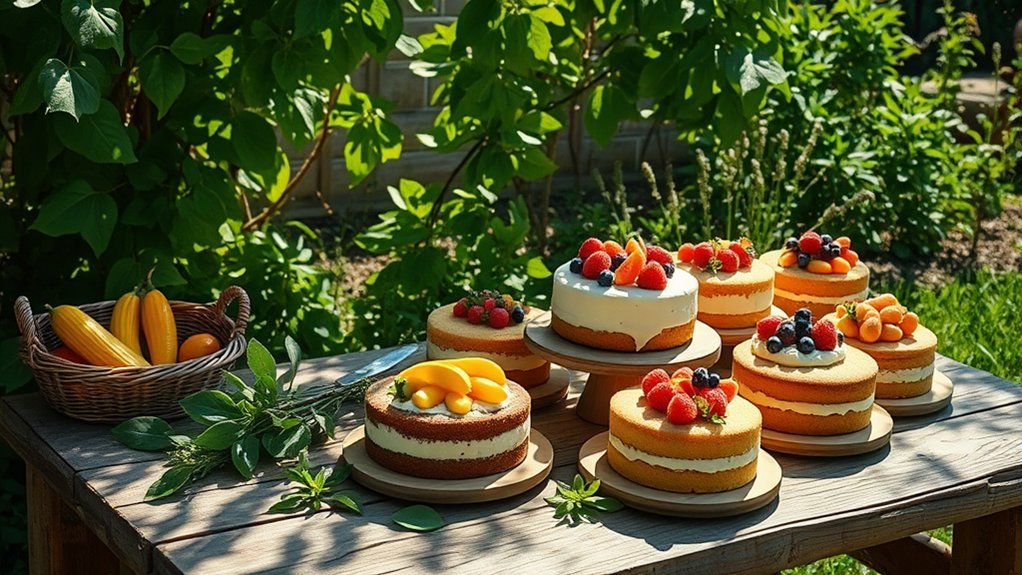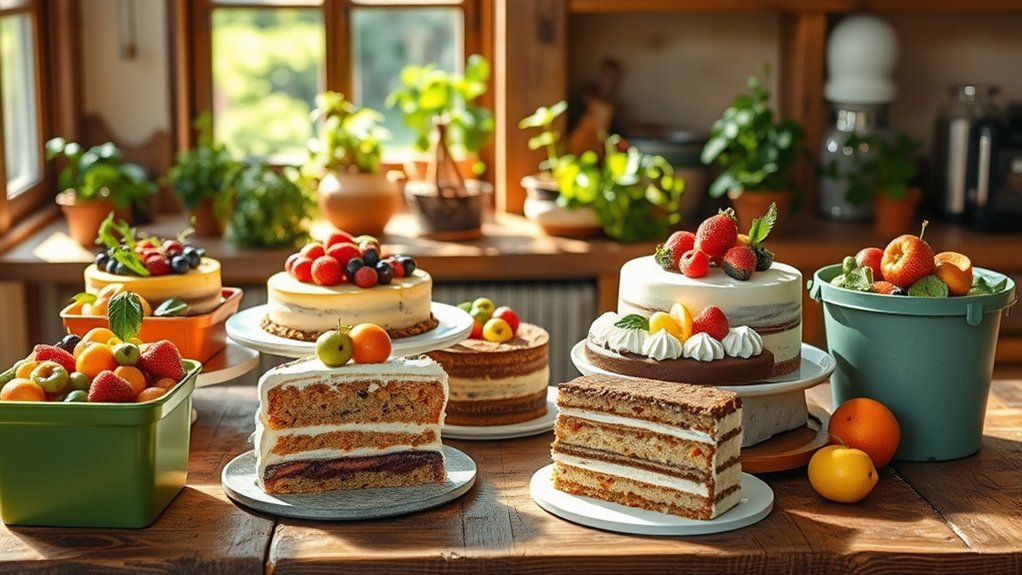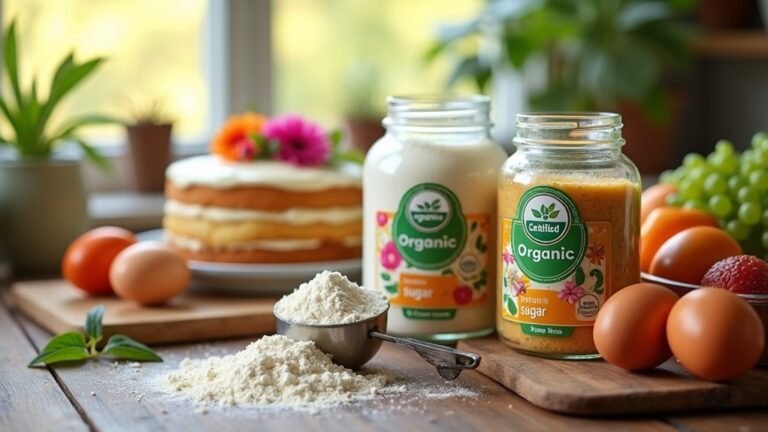The Environmental Benefits of Eating Organic Cakes
Choosing organic cakes not only supports your taste buds but also benefits the environment. Organic ingredients promote healthier soil and improve nutrient availability. By steering clear of harmful chemicals, you help preserve local wildlife and promote biodiversity. Additionally, using locally sourced ingredients significantly reduces carbon emissions. Organic bakeries often implement effective waste reduction strategies, ensuring a minimal environmental footprint. Plus, they contribute to your community's economy. Together, these factors make organic cakes a delicious and sustainable choice for both you and the planet.
Key Takeaways
- Organic cakes use ingredients that enhance soil health and reduce the need for synthetic fertilisers, improving overall environmental quality.
- Choosing local organic ingredients cuts down on transport emissions, significantly reducing the carbon footprint of cake production.
- Organic farming practices promote biodiversity by avoiding harmful chemicals, which leads to healthier ecosystems and wildlife.
- Organic baking helps minimise waste through standardised recipes and eco-friendly packaging, reducing contributions to landfill.
- Supporting organic bakeries not only boosts local economies but also raises community awareness about sustainable practices and healthy eating.
The Impact of Organic Ingredients on Soil and Water Quality

When you choose organic cakes made with organic ingredients, you're not just treating yourself; you're also supporting practices that improve soil and water quality.
Organic ingredients enhance soil health by increasing organic matter, which helps with nutrient cycling and makes essential micronutrients more available. This results in stronger crops, even in tough conditions. By using organic soil amendments, farmers lessen their dependence on synthetic fertilizers and encourage beneficial microorganisms that defend against plant diseases. Additionally, sustainable farming practices promote biodiversity, which further enhances soil resilience. Better soil structure also improves water infiltration, reducing erosion and runoff, which protects water quality. Additionally, organic amendments can reduce reliance on non-renewable resources, further supporting sustainable agricultural practices.
Supporting Biodiversity Through Organic Baking

Choosing organic cakes benefits your health and supports biodiversity. By selecting organic ingredients, you promote the preservation of local ecosystems, as organic farming avoids harmful synthetic herbicides and pesticides. This approach encourages healthier soil and diverse crop rotations, which are vital for a thriving ecosystem. Furthermore, organic methods help maintain genetic diversity and support local wildlife, reducing the risk of biodiversity loss often seen with conventional farming. Additionally, the environmental advantages of organic farming practices contribute to reducing pollution and promoting soil health. Organic farming also prioritizes sustainable practices, which further enhances the ecological benefits associated with organic cakes.
Local Sourcing and Its Role in Reducing Carbon Emissions

Local sourcing is vital for reducing carbon emissions by significantly cutting down transportation distances, which directly lowers greenhouse gas emissions.
By opting for local suppliers, you can dramatically reduce the carbon footprint of your organic cakes. For example, locally sourced apples produce only 0.15 kg CO2e per kg, whereas imported apples generate around 0.85 kg CO2e. This reduction can range from 20% to 80%, underscoring the importance of supporting local producers. Additionally, local sourcing often leads to better quality ingredients and bolsters economic growth in your community. By prioritising local suppliers, not only do you enjoy tastier cakes, but you also help create a more sustainable environment by minimising carbon emissions in your baking. Furthermore, choosing suppliers that focus on sustainable practices enhances the overall quality and eco-friendliness of your baked goods.
Waste Reduction Strategies in Organic Cake Production

Implementing effective waste reduction strategies in organic cake production not only promotes sustainability but also improves profitability. You can reduce food waste by standardising recipes and optimising inventory management, which helps prevent overproduction.
Using eco-friendly packaging cuts down on plastic waste, while creatively utilising ingredients ensures nothing goes to waste. Partnering with local food banks for unsold goods is another responsible way to manage waste.
Adopting energy-efficient equipment and conserving water further demonstrates your commitment to sustainable practices. Embracing composting and recycling initiatives can significantly reduce landfill contributions.
The Economic and Social Advantages of Organic Bakeries

As consumer preferences shift towards healthier options, organic bakeries are enjoying notable economic and social benefits. By sourcing ingredients from local farms, these bakeries boost the local economy and promote sustainable practices. Organic baked goods often come with higher price tags, which can lead to increased profit margins and the creation of jobs in production and marketing.
| Economic Benefits | Social Advantages |
|---|---|
| Higher Profit Margins | Enhanced Health Awareness |
| Job Creation | Community Involvement |
| Support for Local Farms | Education on Organic Benefits |
The growing awareness of health benefits linked to organic ingredients not only helps consumers but also strengthens community ties. These advantages encourage a sustainable lifestyle that resonates with today's mindful shoppers.
Frequently Asked Questions
How Do Organic Cakes Taste Compared to Non-Organic Cakes?
When comparing organic cakes to non-organic ones, you'll notice some clear differences in flavour. Organic cakes often use higher quality ingredients, resulting in a more authentic taste. In contrast, non-organic cakes may contain preservatives that can mask or alter the flavours. For instance, an organic chocolate cake might have a rich, deep cocoa flavour, while a non-organic version could taste overly sweet or artificial. Overall, many people find organic cakes to be more satisfying and true to their ingredients.
Are Organic Cakes Suitable for People With Dietary Restrictions?
Are organic cakes suitable for your dietary needs? Many offer gluten-free and vegan options, making them a good choice for various restrictions. Numerous bakeries can tailor recipes to ensure you enjoy tasty treats that meet your requirements, so you don't have to compromise on flavour.
How Can I Identify Truly Organic Cakes?
To identify genuinely organic cakes, examine the labels for certification details and ingredient sources. Look for recognised certifying bodies such as the Soil Association or the EU Organic logo, which indicate that the bakery complies with strict organic standards. For instance, if you see the Soil Association label, you can be confident that the ingredients are sourced responsibly and meet organic criteria.
What Are the Certifications for Organic Ingredients?
Did you know that 80% of consumers check for certification labels when shopping? Knowing about organic farming certifications, such as "100% Organic" or "Made With Organic Ingredients," can help you spot quality products and make better choices. For instance, "100% Organic" means the product is entirely organic, while "Made With Organic Ingredients" indicates that at least 70% of the ingredients are organic. Understanding these labels can guide you towards healthier selections.
Can I Make Organic Cakes at Home Easily?
Absolutely, you can make organic cakes at home with ease. Start by sourcing organic ingredients, like flour, sugar, and eggs, rather than using conventional products. Look up reliable recipes that suit your taste and dietary needs. This way, you'll enjoy tasty, healthier cakes while also supporting sustainable practices in your baking. For example, try an organic chocolate cake using fair-trade cocoa for a delicious treat that's kinder to the planet.
Conclusion
In summary, choosing organic cakes not only satisfies your cravings but also benefits the environment. By selecting organic ingredients, you're supporting healthier soil and greater biodiversity. Sourcing locally reduces carbon emissions, and employing waste reduction methods in production boosts sustainability. Just as many prefer a classic vinyl record to a digital download, opting for organic treats shows a commitment to quality and caring for our planet.







